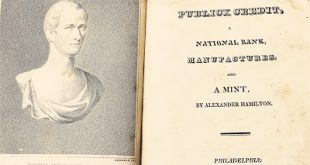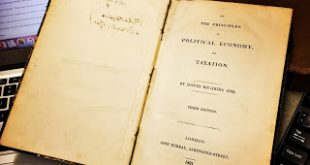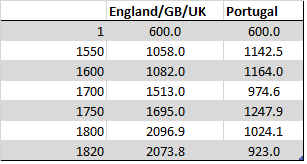[embedded content]Here our other conversation with LP Rochon, about the chapter on Classical or Surplus approach authors. My co-author, Suranjana Nabar-Bhaduri and I talk about the Real Bills Doctrine, Bullionism, Say's Law the implications for theories of crisis. And about several authors, Smith, Ricardo, Tooke and more.
Read More »Why do we need a theory of value?
The theory of value and distribution is at the heart of economics. To be clear, when I say that it is at the center, it means that discussions of almost any topic in economics, in one way or another, depend on a certain theoretical position about the theory of value and distribution. However, most economists have no clue about it, about the centrality of value. Not only they don't understand the original and now infamous labor theory of value (LTV), that dominated between Petty and Ricardo...
Read More »Cohen and DeLong on Hamilton’s Report on Manufactures
Hamilton's Reports, posthumous 1821 edition Stephen Cohen* and Brad DeLong, in their highly readable book Concrete Economics: The Hamilton Approach to Economic Growth and Policy (if you haven't, go buy a copy now), argue that “Alexander Hamilton [was a] major economic theorist. His theory of economic development, first set out in his famous Report on Manufactures (1791), not only reshaped America’s economy but was channeled by Frederich List half a century later to play a central role...
Read More »Ricardo’s Principles turns 200!
On Saturday, April 19th 1817 , David Ricardo published The Principles of Political Economy and Taxation (price was 14s, and 700 copies were printed; later editions had 1000 copies each; my copy above is of the 3rd and definite edition published in 1821, and had at least two previous owners, a college and someone in Philly that signed it in 1901). Most comments on the book tend to emphasize things like rent theory and comparative advantage, but those are not central to the main point...
Read More »A Heterodox and Post Keynesian Bibliography on Trade Theory
I include the odd useful and relevant neoclassical work too. I will update on a regular basis:Baiman, R. 2010. “The Infeasibility of Free Trade in Classical Theory: Ricardo’s Comparative Advantage Parable has No Solution,” Review of Political Economy 22.3: 419–437.Bairoch, Paul. 1993. Economics and World History: Myths and Paradoxes. Harvester Wheatsheaf, New York and London.Brewer, A. 1985. “Trade with Fixed Real Wages and Mobile Capital,” Journal of International Economics 18:...
Read More »Ricardo’s Argument for Free Trade by Comparative Advantage
My purpose here is not to analyse it or refute it in detail, but merely to set it out.Here it is taken from Ricardo’s On the Principles of Political Economy and Taxation (2nd edn.; 1819), in full context:“It is quite as important to the happiness of mankind, that our enjoyments should be increased by the better distribution of labour, by each country producing those commodities for which by its situation, its climate, and its other natural or artificial advantages it is adapted, and by their...
Read More »The Cult of Free Trade in a Nutshell
The argument for unrestricted free trade by Ricardo’s principle of comparative advantage requires a number of stated or hidden fundamental assumptions to work properly, as follows:(1) domestic capital or factors of production like capital goods and skilled labour are not internationally mobile, and instead will be re-employed in the sector/sectors in which the country’s comparative advantage lies;(2) workers are fungible, and will be re-trained easily and moved to the new sectors where...
Read More »Free trade and Portuguese decline
Last weekend, as a result of Brad DeLong's post on free trade, we had a brief Twitter exchange. He had suggested that the Heckscher-Ohlin (HO) model* implies gains from trade associated to comparative advantage. He went further and suggested, after I implied that the Methuen Treaty between England and Portugal had not been favorable to the latter, that Portugal had indeed benefited greatly from free trade.It is important to note, before we get to Portugal, that the HO model, which is a...
Read More »Comparative Advantage and Capitalism
[embedded content] From CAPITALISM the documentary by Ilan Ziv. In this short clip a discussion of comparative advantage and its limitations, with Pascal Lamy, Robert Boyer and yours truly (many others in this chapter, including Geoff Hodgson and Ha-Joon Chang).The Mexican secretary of finance that appears in the video is actually NOT talking about the Ricardian model of trade, which at least given its assumptions is logically correct, but about the neoclassical or Heckscher-Ohlin-Samuelson...
Read More » Heterodox
Heterodox



